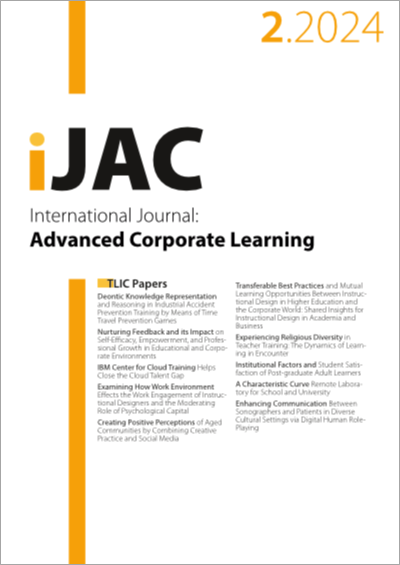Deontic Knowledge Representation and Reasoning in Industrial Accident Prevention Training by Means of Time Travel Prevention Games
DOI:
https://doi.org/10.3991/ijac.v17i2.42975Keywords:
industrial accidents, accident prevention, prevention training, training experience, time travel prevention games, adaptivity, trainee modeling, theories of mind, modal logic, deontic logic, theory of mind inductionAbstract
Industrial accident prevention is an issue of societal relevance to avoid loss of human lives, injuries, damage of installations, and financial losses. The authors deploy game-based training in virtual environments where trainees experience challenges of safe operation and disastrous self-induced accidents. Nothing is more affective and, thus, effective than a trainee’s own experience. Time travel prevention games are a game category particularly tailored to the needs of human players who look for opportunities to make good for a damage. Time travel pre-vention games for purposes such as accident prevention in the industries are ad-vantageous due to their conservation of resources including human health and lives. They are affective by allowing for unprecedented learner/player/trainee ex-periences and they are effective due to the fascination of application-oriented game play including opportunities to influence the fate, the latter being less close to reality, but the more attractive and worth telling. For optimal guidance to human trainees, the digital game system needs to learn about the trainees’ strength and weaknesses, about needs and desires. In terms of behavioral sciences, the system observing a human’s behavior hypothesizes theories of mind. In training games, modalities of events/actions are decisive. There are modalities of events/actions such as possibility, unavoidability, and the like as well as obliga-tions and oughts. Training aims at the emergence of cognitive states that are use-ful in practice. The system’s reasoning is deontic.
Downloads
Published
How to Cite
Issue
Section
License
Copyright (c) 2024 Oksana Arnold, Ronny Franke, Klaus P. Jantke, Prof. Dr.-Ing. habil. Rainer Knauf, Tanja Schramm, Hans-Holger Wache

This work is licensed under a Creative Commons Attribution 4.0 International License.



